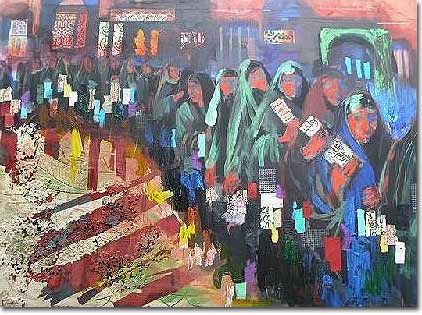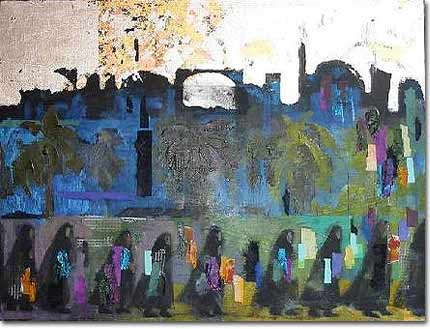A Journey Through New Beginnings by Maymanah Farhat
Iraqi-American artist Leila Kubba's latest series New Beginnings was inspired by a recent visit to her native Iraq after a twenty-year absence.
Through New Beginnings, Kubba explores the Iraq she once knew and the difficulty of facing the dramatic changes that have been unfolding since the 2003 American invasion. Kubba's work addresses the complexities of war and occupation. Her paintings serve as testimonies to the devastation of war and communicate the vulnerability and chaos felt by Iraqis today.
Though the issues Kubba addresses are tragic, she offers her viewers a sense of hope and inspiration through the strength of her figures. When asked about the inspiration for New Beginnings Kubba said, "When I came back from Iraq, I thought about the impressions that I had and what I would paint about. Of course the first thing was the difficulty of the war, and the chaos that I saw, mixed with all the emotions of returning and seeing many of my friends and family. I thought of the beautiful date trees that were so fragile and yet so resilient, they were still standing there in spite of all the horrors of the war. The women that I saw there were just like that too, fragile and yet so resilient. These thoughts were the inspiration for this group of paintings".

Kubba's techinique of creating multiple layers with vibrant colors, various textures and mediums creates works that are multidimensional in composition and concept. When asked about her motivations for using such methods she said, "I use texture as part of my painting expression. I always start a painting with laying the groundwork of putting differing textures; in this way I am creating a history to the canvas. Before applying the colors I approach the painting as a piece of sculpture or a relief, and I layer with different colored glazes, to see the different effect of these glazes on the varying surfaces, also to give a sense of depth. In this way I like to give the feeling that the viewer can't see the whole painting at the first look, there are hidden parts that start to show the more you look at it".
The history and current political situation of Iraq are articulated through the use of bold figures and symbolic representations of its great past. When asked about the constant presence of women in the paintings of New Beginnings Kubba said, "I did not choose the women in the Abayas; they seem to have chosen me! They imposed themselves into these recent paintings. After I came back from Iraq I started with painting the date trees and continuing with my previous themes of Sumerian mythologies, but the power of these women who have had to bear so much started to appear and their powerful dark forms took over some of the paintings. The darkness of the Abayas contrasts with the unveiled life around them".

Some viewers have focused attention on Kubba's dark figures of Iraqi women dressed in long black garbs. Such figures are often interpreted, as a direct comment on the so-called oppression of women in the Middle East. When asked about such interpretations Kubba affirmed, "In these paintings I did not mean to focus on the oppression of women, these women are just trying to survive and feed their families, deal with death and war, oppression in these circumstances is not the top priority. Surviving is their priority…The West has a narrow and simplistic view of the role of women; I don't want to see that role from this point of view. I want to feel with the women who are dealing with their problems and are not thinking that they are oppressed, especially now in Iraq…These women that I have painted are intelligent women with strong features and the Abaya is what they happen to wear. Men and women are being killed in the dozens every day, that is more important at this time than anything else."
Kubba's work delves into a world that few of us can comprehend. Pandemonium is contrasted with beauty and depth. New Beginnings intrigues the viewer with the power of a people, culture and history trying to survive.
Maymanah Farhat